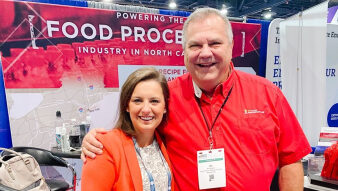Mary Lesa Pegg Q&A: Partnerships Are Everything

Mary Lesa Pegg is the food and beverage Business Recruitment Manager with the Economic Development Partnership of North Carolina (ENPNC), a nonprofit public-private partnership focused on sustainable job creation in North Carolina. NCFIL spoke with her about her perspective on the plant-based food industry.
NCFIL: What’s your perspective on the national state of the plant-based food manufacturing sector over the past five years?
Mary Lesa Pegg (MLP): The last five years has seen a national increase in food projects. Food companies want to expand, but they’ve experienced talent changes and shortages. This has led to an increase in innovation and increased partnerships with opportunities to recruit and retain talent. Over the last two to three years, North Carolina specifically has seen an increase in the food innovation space and in food sustainability, resulting in companies being more interested in our state’s clean energy plan, for example.
NCFIL: What role does the EDPNC play in the food manufacturing space in our state?
MLP: We envision our role as the collector of opportunities. Our goal is to best utilize our innovative assets, like our partnerships with NCFIL and the North Carolina Biotechnology Center (NC Biotech), and bring the right people to the table, to attract food and beverage businesses to North Carolina. Having these assets helps demonstrate to prospects that not only is North Carolina a good business decision in general, it is also a good decision due to the assets we have in place to grow and market an existing or new product.
North Carolina is a major agricultural state, which is a prominent part of our history. We’re also a worldwide leader in the life sciences. Innovative food and beverage companies looking at North Carolina are often looking for the perfect mixture: a state with a strong agricultural history as well as a thriving technology and life sciences climate. There’s no better spot than North Carolina.
NCFIL: How do we more effectively position North Carolina’s food manufacturing sector on the national and international stage?
MLP: We need to continue to tell our story. We need all partners across the state to make it known that we not only do traditional agriculture and food processing well, but we also succeed in handling the food innovation and life sciences part of the industry, and we have the resources and talent to ensure these companies are successful.
Helping to provide and train talent is very attractive to a prospective company. North Carolina needs to be actively focused on talent. Here’s an example of how supporting talent development helped land Believer Meats: Wilson Community College (WCC) will offer training to Believer Meats employees, so they can easily transition to the Believer Meats manufacturing floor following training. And NC Biotech offered Believer Meats funding dollars to secure the equipment needed for WCC’s Believer Meats’ employee training.
It really all comes down to partnerships; it’s important to bring partners to the table.
NCFIL: You work to bring food companies to North Carolina. Tell me about recent success stories. Why are food companies choosing to build/relocate in our state?
MLP: North Carolina has seen huge success, and companies are starting to take notice. In fact, CNBC recently ranked North Carolina the best state for business. Not only do we have a good business climate, but food and beverage companies just want to be part of the success that is happening here.
I also credit Secretary of Commerce Machelle Baker Sanders’ “First in Talent: Strategic Economic Development Plan for the State of North Carolina” for our success. It’s a road map for North Carolina’s economic development issued in July 2021. This proactive focus on talent is the state’s attempt to combat nationwide talent challenges, and it’s working.
Here are some 2022 success stories:
- Believer Meats : 100 jobs, $123M investment, with $60K average wage in Wilson County
- Do Good Foods: 100 jobs, $100M investment, with $65K average wage in Johnston County
- Hans Kissle: 230 jobs, $43M investment, with $41K average wage in Gaston County
These companies represent three different layers of food innovation with Believer Meats being the most innovative, Do Good Foods being traditional but more sustainable, and Hans Kissle being traditional. Handling this diversity of product is what North Carolina can do so well.
NCFIL: Do you see specific areas of opportunity or roadblocks to overcome for North Carolina to consider as we enter the next five years?
MLP: For opportunity, we started 2023 with a strong pipeline, and I anticipate some announcements coming soon. We continue to play off past successes while we keep building upon our marketing plan.
For roadblocks, we must focus on our clean energy capabilities as companies are invested in this. We also need to be vigilant on how we tell North Carolina’s story as well as continue to pull partners to the table and support those already there, like NC State University and North Carolina A&T State University faculty, NC Community Colleges, NC Biotech, workforce development boards, and more.
Lastly, talent is a challenge for everyone, not just food and beverage business recruitment. We must be mindful of how we grow programming to prepare talent for some of these more skilled jobs.
Learn More
Interested in what’s happening with the EDPNC and economic development in North Carolina? You can follow their activity here. You can also learn about the plant-based food industry via NCFIL News.
- Categories: